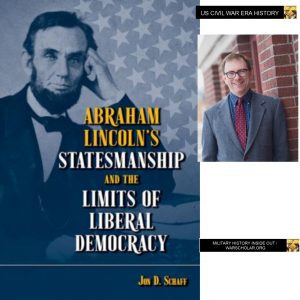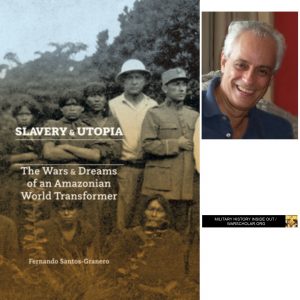
http://siupress.siu.edu/books/978-0-8093-3737-8
When people hear the name Lincoln, they usually think immediately of the U.S. Civil War and the incredible violence and hate that marked that national conflict. However, Lincoln was in charge of more than just the Union military. He also had to worry about the many needs of the nation ranging from agricultural production, infrastructure management, the economy, education, and so on. These things weren’t put on hold simply because of the war.
As such, Lincoln still had to deal with politicians and voters. While victory and defeat on the battlefield dominated headlines, there was much to do to keep the country steady. His decisions and negotiations with Congress helped shaped the country after the war nearly as much as the war did.
Jon Schaff has written about Lincoln’s approach to running the government and uses the development of major pieces of legislation as a way to show the practical applications of Lincoln’s leadership philosophy. I spoke with him about his book Abraham Lincoln’s Statesmanship and the Limits of Liberal Democracy and the struggle of one man to raise up his nation for the betterment of all.
How did you become interested in studying and writing on the subject of your book?
When I was a graduate student I intended to write a dissertation about a completely different subject. My advisor then pointed out to me the dearth of research on Lincoln as a non-war president. We focus so much on Lincoln as commander-in-chief that we seldom consider the other aspects of the presidency. Given that the Civil War was also an era of great public policy change, this seemed odd. So I wrote a dissertation on it. My interest in Lincoln has greatly expanded since then, but that’s where it started. From the moment I started researching Lincoln I was hooked.
What aspect of this subject does your book focus on?
The book is split into two parts. The first part looks at Lincoln’s philosophy of government, namely looking at the virtues of prudence and moderation that are at the heart of statesmanship, Lincoln’s defense of natural rights, and finally Lincoln’s views on the powers of government and economics. The second half of the book look’s at Lincoln’s presidential leadership in marshaling through major pieces of legislation during the Civil War. These include the Homestead Act, Land-Grant College Act, Pacific Railroad Act, National Bank Act, and Legal Tender Act.
What are the major themes of this book?
The major themes of the book are indicated in the book’s title, namely statesmanship and limits. I am interested in Lincoln as the statesman par excellence. Today we have a noticeable shortage of statesmanship, so I think it is time we look to a model of statesmanship to better appreciate what qualities we should be looking for in leaders. One of the main components of statesmanship is the notion of limits. We often confuse the voice of the people with the voice of God, but a statesman, like a good parent or a good friend, will tell us that we must limit our desires. Not everything we long for is good for us. So I look at prudence and moderation as the main virtues of the statesman. Prudence because it tells us that even when attempting good things we must be conscious of using proper means. Moderation because the statesman must balance various competing goods. I also show how Lincoln favored strong but limited government. In addition, in his theory of “free labor” Lincoln advocated an economics that puts freedom above unlimited economic gain. Finally, Lincoln’s theory of the presidency, contrary to the modern presidency, is one that sees limits to the president’s power and when dealing with non-military policy is largely deferential to Congress.
In regards to Lincoln’s views on limits of the government, did Lincoln view the Confederate states as still part of the Union and to whom he would continue to apply limited government as best as possible, or did he believe the Confederacy should not be afforded his preferred applications of moderation and statesmanship until after the war was over?
These are not mutually exclusive. Yes, the Confederate states were part of the Union, but obviously in fomenting rebellion they lost some of their legal rights. But still Lincoln was, I’d argue, prudent and moderate in respect to the South. Notice how in the run-up to war Lincoln favored a Constitutional Amendment forgoing any federal power over slavery where it existed, excepting a compensated emancipation. Lincoln countermanded orders from military generals that had proclaimed slaves forever free in certain areas. Lincoln argued that if anyone would do such a thing as a war measure, it must be the commander-in-chief. Lincoln had an overall concern that when the war was over that the Union had to be able to come together. This is the whole ethos of the Second Inaugural and Lincoln’s approach to reconstruction, which was far more modest than envisioned by Radical Republicans in Congress, as evidenced by his veto of the Wade-Davis reconstruction bill.
What resource materials did you use for your research?
Well, lots of course! The two most important sources for the book were Lincoln’s Collected Works as edited by Roy Basler and the Congressional Digest (today the Congressional Record). The Collected Works are now online, but early in my research on Lincoln I was generously gifted this eight-volume set by a friend. It has proved indispensable in many ways. I still prefer reading the books rather than looking online. The Congressional Digest was crucial to laying out the legislative history of the major pieces of non-war legislation of the Civil War era. Again, much of this is online today. I spent countless hours looking at microfilm. It was good for my soul. Bad for my eyes.
What part of the research process was most enjoyable for you?
Reading Lincoln, naturally. Of course much of what is in Lincoln’s Collected Works is mundane and of modest importance. But there are regular nuggets of pure brilliance. There is a reason why Lincoln is so thoroughly researched. He is exceedingly deft in the use of the English language and his mind is so lucid that there is incredible depth to his major works. Also, reading Lincoln’s letters gives you some idea of how funny he was. He really could tell a joke.
What did you discover in your research that most surprised you?
I don’t know if I’d call it a surprise, but I think one of the book’s central conclusions is precisely opposite to conventional wisdom Lincoln was quite deferential to Congress in all matters not concerned with the war. Lincoln is so often held up as a model of aggressive presidential leadership that many will be surprised to find that Lincoln provides little precedent for our modern presidency-centered politics.
I think the most original portion of the book is where I compare Lincoln’s views on economics to the 20th Century economic theory of Distributism, an economic theory that owes much to Catholic social teaching of the time. Lincoln certainly condemned slavery, but he also did not consider wage-labor to be truly free labor. Lincoln’s economic vision was one of small farmers, small shops, local industrialists. A person should both partake of capital and labor, i.e., have ownership in business and work at the same time. Lincoln would be disappointed at how many Americans today work for “the man” instead of working for themselves.
Did Congress focus on non-war issues as much as Lincoln or perhaps more so? How did that affect his approach to getting legislation passed?
Yes, very much so. This goes along with policy theory that the kinds of policies that dominated Congress in this era tended to be of a nature that would lend themselves to congressional leadership. I think Lincoln deferred to the practice of his age, which was deference to Congress in policy matters. One of the book’s ultimate points is that there is much virtue in this much more limited conception of presidential power.
Foreign affairs and foreign actors impacted Lincoln’s concerns about the war. Which countries might throw their support behind the Confederacy for example. Did these same factors impact non-war issues that he was facing?
The classic example is that Great Britain thought about intervening on the part of the South due to the desire for cheap cotton. I don’t see any impact with non-war matters, however.
Did you get a strong idea of how much of his legislation was designed to shape the South after the war, again in regards to non-war issues?
I don’t think any legislation, outside of overt reconstruction legislation, was aimed at the South. A minor caveat to that was that Southerners where not that supportive of Homestead legislation as it gave incentive to populate the West with free labor agriculture, which tended to mitigate against Southern pro-slavery interests.
Was there anything you discovered that moved you?
Regarding Lincoln and free labor, there is a line in his speech in Wisconsin in 1859 on agriculture that really affected me. He envisions a society of free laborers who are self-sufficient. He says, “No community whose every member possesses this art, can ever be the victim of oppression in any of its forms. Such community will be alike independent of crowned-kings, money-kings, and land-kings.” I find that notion inspiring.
What was the most difficult issue to research?
I don’t know that I’d call any issue difficult. Certainly the history of legislation in the 37th Congress (the first Congress of the Civil War) was the most time consuming. I wanted to know not just the congressional debate, which itself was time consuming to get through, but the history of key figures in Congress. To get a full picture of what was happening in that Congress wasn’t what I would call difficult, but it was tedious at times.
What might Lincoln’s legislative priorities have been had there not been a war?
This is a great question. I think you would have seen Lincoln attempting to enact a Whig-style economic agenda, namely a system of tariffs, internal improvements, and matters such as Homestead and railroad legislation designed to promote economic diversity. I also think absent war Lincoln may have paid more attention to Native issues and probably would have dealt more gently with them than ultimately occurred. Lincoln was not enamored of “Manifest Destiny” (see his opposition to the Mexican War) and despite his encouragement of Western settlement was less ideological about Western expansion than most. And, yes, Lincoln would have pursued, I think, some kind of gradual compensated emancipation solution to slavery.
What do you hope the book will do for readers?
I hope the book inspires people to think harder about statesmanship and what it takes to have a decent democracy. I write in the introduction that part of the inspiration for the book is the notion that we take democracy for granted. We have had a pretty good run in America, and I think we have lost the sense that democracy needs certain virtues that require cultivation. That’s the job of the statesman. I do think that there is a general consensus that things are not well with our democracy, and I hope this book can help us diagnose those problems and give some idea of solutions. This is done by taking us out of our time and maybe seeing democracy anew in the statesmanship of Abraham Lincoln.
Did you have any difficulties in finishing the book and publishing it and if so, how did you overcome those?
My biggest difficulty in finishing the book was time. I worked on this book for many years. I work at a teaching heavy institution, which I like, but it makes finding time to write very difficult. So it was slow going. Thank goodness for sabbaticals! I didn’t have a lot of problem getting the book published. A friend suggested I approach Southern Illinois University Press. While they were a little hesitant at first, but they eventually saw the value in the project. The review and editing process was a little slow, but the people at SIU were a joy to work with and I know that they made my book better with their suggestions.
What is your next research or writing project?
I have two projects cooking. I actually have another book coming out in December, co-authored with a friend who teaches in the Communication department at Duquesne University. It is called Age of Anxiety: Meaning, Identity, and Politics in 21st Century Film and Literature. If you want to find out about that book it is up on Amazon (although not for sale yet). I am also beginning a project in which I will present Lincoln as a synthesis of the founding clash between Jefferson and Hamilton. I think Lincoln combines Jefferson’s dedication to natural rights and concern with self-sufficiency as a hallmark of a free people with Hamilton’s belief in an economically diverse, commercial nation. In addition, Lincoln shares Hamilton’s distrust of Jefferson’s populism while avoiding the anti-democratic elitism that sometimes infects Hamilton’s thought. Through this synthesis Lincoln builds a political teaching better than either founder’s thought. Or so I think right now!
Do you have any online accounts where people can find more of your work?
I have a website: jonschaff.com that has a bunch of my writing on it. I can also be followed on Twitter @JonDSchaff.
Author Biography
Jon D. Schaff
Professor of Political Science
Northern State University
Author of Abraham Lincoln’s Statesmanship and the Limits of Liberal Democracy
Southern Illinois University Press, 2019.

 Stephen Harding is currently editor of Military History Magazine. He’s been an Army staff historian, a magazine writer and editor and he’s written numerous popular books on World War II. We talk about his latest book “Escape from Paris” which focuses on three B-17 gunners shot down over France and the young French woman and her family who help them evade capture in German-held Paris.
Stephen Harding is currently editor of Military History Magazine. He’s been an Army staff historian, a magazine writer and editor and he’s written numerous popular books on World War II. We talk about his latest book “Escape from Paris” which focuses on three B-17 gunners shot down over France and the young French woman and her family who help them evade capture in German-held Paris.